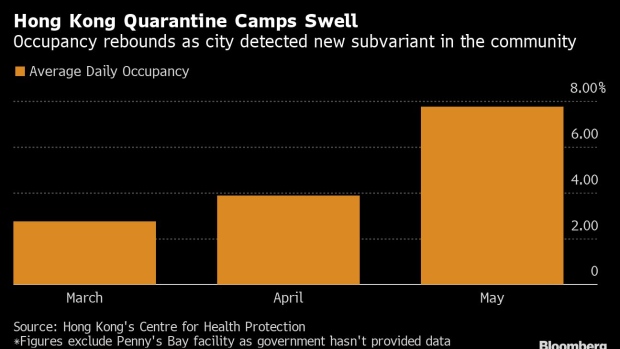Jun 2, 2022
Hong Kong Quarantine Backtrack Stokes Fears of Covid Zero Return
, Bloomberg News

(Bloomberg) -- Hong Kong’s revival of mandatory centralized quarantine for people linked to cases of new omicron sub-variants raises fresh concerns from the business community over the city’s reputation as a financial hub.
A return to harsh Covid Zero measures like quarantine camps risk further damaging confidence in the city and runs counter to the easing of restrictions in recent months, business groups said. The new sub-variants also do not pose a threat of igniting a major outbreak, according to a local public health expert.
“The initial reaction among our members is one of frustration and renewed loss of trust,” said Johannes Hack, president of the German Chamber of Commerce in Hong Kong. “For our stakeholders abroad, until they can visit Hong Kong entirely freely again -- like practically all other places -- we will find it hard to make a convincing case of the city’s benefits.”
Read more: Hong Kong Backpedals on Home Quarantine for Covid Sub-Variants
Health officials said Wednesday that people infected with sub-variants including BA.2.12.1 who aren’t severely sick, as well as their close contacts, will be sent to government facilities like Penny’s Bay. It’s a reversal of a practice that had allowed most mildly ill patients and their close contacts to stay at home that’s been in place since February.
The government said Wednesday the move is a precaution and doesn’t signify a change in the overall quarantine and isolation policy.
Business groups remained fearful.
“We will continue to lose international talent and businesses, impacting Hong Kong’s competitiveness even further,” said Joseph Armas, chairman of the American Chamber of Commerce in Hong Kong. “AmCham pleads for a realistic exit plan to get back to business and back on the map as a global city.”
“We believe it is very important there is no backtracking in the approach taken to manage any community spread and that any measures that are taken do not cause worry and fear,” said David Graham, executive director at the British Chamber of Commerce in Hong Kong, describing the pivot as disappointing.
“While we appreciate that the government has to react to evolving circumstances, we were hoping to see further easing of the restrictions which ultimately supports the building back of confidence in Hong Kong as an international hub,” he said.
The arrival of new sub-variants to Hong Kong, including BA.4 and BA.5 hasn’t caused a substantial spike in daily cases, which total just hundreds per day. But several virus clusters that have recently emerged have sparked concern about community transmission. Outgoing Chief Executive Carrie Lam this week said she’s unlikely to announce a further easing of social distancing curbs as planned in June due to a series of outbreaks stemming from bars.
Read more: Hong Kong Unlikely to Ease Final Social Curbs After Bar Clusters
“We would strongly exhort the authorities to stay the course with the three-phase relaxation plan and do not flip-flop” said Sally Wong, chief executive officer of Hong Kong Investment Fund Association, which represents more than $1.6 trillion in assets under management. The group has advocated for home quarantine for people with sufficient space, and Wong said the government should use its facilities for those who can’t effectively self-isolate.
Health officials have said the more stringent quarantine measures are needed because the sub-variants they’re monitoring have higher transmissibility and immune escape, but a leading local medical expert said it has little scientific backing.
The sub-variants won’t be able to cause a major outbreak because they are of similar virulence to the type of omicron already widely circulating and more of the population are vaccinated, said University of Hong Kong infectious disease expert Ivan Hung. “Omicron infection is mild, especially for those who have completed three doses of vaccination and there are very few severe cases and mortality.”
What We Know About Omicron and Its Sub-variant BA.2: QuickTake
The government may also be wary about a surge in cases around July 1, the 25th anniversary of Hong Kong’s return to Chinese rule and the day John Lee will take over as chief executive, according to Steve Vickers, chief executive officer of Steve Vickers and Associates, a Hong Kong-based political & corporate risk consultancy. It’s unclear if Chinese President Xi Jinping will visit the city for the event, though he traveled to the financial hub for the 20th anniversary.
With so many security concerns surrounding July 1, it’s “common sense” that Hong Kong officials need to be vigilant, said Vickers. “Measures will be intense but short term and things will resume normal quickly.”
©2022 Bloomberg L.P.


